Report of the IUPsyS Capacity Building Workshop for Countries of Central Asia: “Disaster and Bereavement”
Tbilisi, Georgia November 17-21, 2012
Following the success of the series of three capacity-building workshops, funded by the German Academic Exchange Service (DAAD) as part of its “Conflict Prevention in the South Caucasus Region,” the then President of the International Union of Psychological Science (IUPsyS), Professor Rainer K. Silbereisen (University of Jena) submitted a proposal for funding to hold another workshop that would take the work further, this time focusing on psychologists from countries in Central Asia (CA). Funding was subsequently granted and the Capacity Building Workshop for Countries of Central Asia: “Disaster and Bereavement” took place in Tbilisi, Georgia, in November 2012.This is a report of that workshop.
Background
Natural disasters, such as earthquakes, floods and storms, and directly man-made catastrophes, such as wars, affect large segments of entire populations, destroying infrastructure, causing human loss, and displacing people. The resulting deterioration of social capital and mental health requires responses, and psychology has a role to play in this. Given the rapid increase in the incidence of such disasters doubling over the last decade with more than 2 billion people affected, research conducted under the auspices of IUPsyS can attest to a dramatic mismatch between the need for expertise on the psychological consequences of disasters and the representation of relevant scientific knowledge and modes of intervention at the mass population and individual levels. Further, as our research has also shown, in many countries across the world paradoxically, especially in those most affected by disasters, the inclusion of psychology education and training in ordinary university programs dealing with the aftermath of a disaster are rare.
In response to this evident need, and with generous support from the DAAD, IUPsyS organised and ran a series of workshops on the psychological effects of disasters with participants drawn from three countries of the Caucasus region – Georgia, Armenia and Azerbaijan. The first workshop: Bereavement Research and Practice, held in Jena, Germany in 2009, focused on the topic of bereavement from a theoretical perspective (including models and theories on bereavement after normal lifespan-related loss of family and friends, after loss due to accidents and natural catastrophes, and after loss caused by armed conflicts). The second workshop, also held in Jena, Germany in 2010, was entitled Intervention following Bereavement: Application & Training and focused on practical issues and their application in dealing with bereavement and trauma following disasters. The third workshop, held in Tbilisi, Georgia, in 2011, built on and extended the training on ways to treat bereavement started in Workshop 2. This workshop also had a special focus on curriculum development related to the causes and consequences of bereavement, including course implementation and evaluation. Full reports on these workshops can be found at: http://iupsys.uat.wiley.com/events/capacity-building-workshops/index.htmls.
As the Caucasus series of workshops proved to be a highly successful model, being very positively evaluated by all involved, especially by the participants, IUPsyS felt encouraged to continue the work, this time focusing on countries in Central Asia, a region where a high percentage of the world’s natural disasters occur. For example, in some CA countries, the majority of the population live in areas of high or very high seismic hazard: 99.9% of the population in Kyrgyzstan, 88.3% in Tajikistan, and 80.4% in Uzbekistan come under this heading.
Central Asia Workshop: Goals and Expected Outcomes
Primarily, the rationale for the CA workshop was the same as for those of the Caucasus series: to pursue capacity building for individual scientists, especially of the younger generation, but also with a view to strengthening the organizational structures of psychology in the region. Underpinning the workshop planning was also the belief that psychology in emerging nation states and societies should represent first class science, while at the same time recognizing specific national needs concerning psychological knowledge and types of intervention. For this first workshop in a new region, and given that the level of participants experience and expertise would be largely unknown, topics and structure were chosen so that participants could learn in a step-wise fashion: first being introduced to the topic and theories related to the psychological consequences of disasters; then learning about and experiencing types of interventions that can help people cope with consequences of disasters, such as grief, complicated bereavement, and Post Traumatic Stress Disorder (PTSD). The importance and possibilities concerning institutional and organizational capacity building were also covered.
This workshop also aimed to further the development of Georgia as a potential regional hub for this and other subsequent capacity building activities in the region. To this end, the workshop also sought to build on the expertise gained from the three Caucasus workshops, and to draw on Georgia’s membership of IUPsyS. In line with these aims, the workshop also aimed to involve young scientists from the Caucasus region that had been involved in the Caucasus workshop series in the planning and delivery of the CA workshop.
Implementation
Planning Group
As for the Caucasus series of workshops, the organizing team for the Central Asia Workshop was led by Professor Rainer K. Silbereisen (as President/Past President of IUPsyS and Director of the Center for Applied Developmental Science, University of Jena, Germany) and Professor Wolfgang Miltner (Head of the Department of Clinical and Biological Psychology, University of Jena, Germany). Dr Verona Christmas-Best (Center for Applied Developmental Science, University of Jena, Germany), Dr. Martin Obschonka (Center for Applied Developmental Science, University of Jena, Germany), and Dr Maria Pavolva (Graduate School for Human Behaviour in Social and Economic Change) made up the rest of the organising team in Germany. Professor Tea Gogotishvili from Tbilisi State University, Head, Psychological Counselling and Training Centre at the Patriarchate of Georgia, and Director of the D. Uznadze Georgian Psychological Society (www.geopsys.ge) acted as liaison and local organizer in Tbilisi. Secretarial help was provided by Mss Stefanie Gläser and Katrin Müller, both of the Department for Developmental Psychology and the Center for Applied Developmental Science, University of Jena, Germany.
Recruitment and selection of participants: Central Asia
The workshop was seen as being of interest to doctoral students, post-docs, and more senior scientists involved in any academic psychology program, especially if it covered the topic of treatment of bereavement from a broad interventionist perspective, but of particular importance to those involved in clinical psychology and related fields, such as developmental and social psychology. Participants were expected to be normally resident in a country classed as in Central Asia, to be willing to attend and participate in the whole workshop, and to present a poster on their current research and empirical work to their fellow participants and faculty.
Given the challenges experienced by the organizers when undertaking recruitment of participants for the first Caucasus workshop in 2009, attempts to make contact with institutions of higher education in the CA region were undertaken early in 2011. It soon became clear that language was going to be an issue and that it was necessary for a Russian speaker to take over the recruitment process: we were very fortunate indeed to have Dr Maria Pavlova, a Russian national, join the team of organizers and oversee participant recruitment. As can be seen from the following, this was not an easy process and many valuable lessons were learned for any future work planned for the region.
To start the recruitment process, eligible institutions (i.e., leading universities that had psychology programs) in three countries of Central Asia, namely Kazakhstan, Kyrgyzstan, and Turkmenistan; three was the minimum number required by the DAAD, and experience suggested that including more would not work so well, largely due to ethnic and political heterogeneity. Initially, the contact details of five institutions in Kazakhstan, four in Kyrgyzstan, and three in Turkmenistan were identified via the Internet. Contact details were mostly phone numbers, less often emails (which were, in any case, typically not working), and they often referred to the rector’s office rather than to specific departments. When dialled, some numbers appeared not to be working because of area code changes or other problems. Eventually, phone contact was established with four (out of five) institutions in Kazakhstan, two (out of four) institutions in Kyrgyzstan, and one (out of three) institutions in Turkmenistan. In Kazakhstan, employees of the only university that was not reached by phone learned about the workshop by word of mouth and got in touch with us themselves. In Kyrgyzstan, one additional institution was reached several months later via email.
Negotiations with Turkmenistan were particularly difficult: There turned out to be few Russian speaking and still fewer English-speaking university employees; the employees’ travels abroad were strictly monitored; we were required to submit invitations via the Ministry of Foreign Affairs and the Ministry of Education; and finally, our only contact person was not able to participate for not well articulated reasons. As we were not able to recruit any participants from Turkmenistan, a decision was taken to seek participants from two other countries in the region, Uzbekistan and Tajikistan. Five institutions in Uzbekistan and two institutions in Tajikistan were identified with the same procedure; of those, four in Uzbekistan and two in Tajikistan were successfully contacted by phone.
Valid email addresses were obtained from each of the contacted institutions. These were either private emails of one of the department employees, usually a chair, or departmental email accounts, which, however, had been created using free webmail domains, such as @mail.ru. That is, only in very few cases did the universities have their own email systems and provide their employees with university email accounts. This appeared to be one of the reasons why email addresses were usually not provided on the department web pages. An official invitation to apply for participation in the workshop (in English and in Russian), together with additional information about the workshop and IUPsyS, was sent repeatedly to each of the email addresses obtained. Where no feedback was received via email, phone calls served to re-establish the contact, a strategy that was usually successful.
Letters of interest from potential participants, some in Russian and some in English, were received from four institutions in Kazakhstan, three in Kyrgyzstan, one in Turkmenistan, two in Uzbekistan, and two in Tajikistan. (A few candidates had no current university affiliation but were university graduates; those who had no relation to psychology or psychiatry were not encouraged to apply.) In Kazakhstan, of the 12 individuals who expressed initial interest, 10 submitted full applications (including a CV, a letter of motivation, and a short description of current research) or at least an application that could be processed; in Kyrgyzstan, the application rate was 11 out of 12; in Uzbekistan, 7 out of 11. In Turkmenistan, no final applications were received, and in Tajikistan, all initially interested persons submitted full applications to attend. Although these figures show that the ratio of submitted applications to the number of interested persons was high, the candidates apparently found it difficult to submit full applications in English. Consequently, the recruitment process lasted many months, and several (mostly low-quality) applications were submitted in the last weeks before the workshop. Furthermore, institutions were disproportionately represented by the applications: some institutions provided many candidates whereas others provided few or none at all.
Selection was based on goodness of fit between an applicant’s area of research interest and the aims of the workshop, as well as on the quality and suitability of their abstract and CV; participants were also screened for their level of competence in English, whereby at least some command of English was desirable. Selection aimed at ensuring a balance within the workshop with regard to the number of participants from each country, to gender, and to academic status. Selection criteria were more lenient towards those who came from underrepresented countries and/or institutions. As a result,official invitations to attend the workshop were sent to six candidates from Kazakhstan (representing three institutions), eight candidates from Kyrgyzstan (representing three institutions), four candidates from Tajikistan (representing two institutions), and six candidates from Uzbekistan(representing two institutions), which made 24 participants altogether (corresponding to the target participant number). The rejection rate was therefore 25% (40% in Kazakhstan, 27% in Kyrgyzstan,14% in Uzbekistan, and 0% in Tajikistan). Two invited candidates from Kyrgyzstan (whose applications were of very high quality, also in terms of English) were unable to participate because of a clash between pre-existing engagements and the dates of the workshop. All six invited candidates from Uzbekistan initially confirmed their participation, but then cancelled very shortly before the workshop, apparently because their institutions did not give them a leave (this was decided at the level of the Uzbek Ministry of Education). Strenuous attempts by the workshop organizers to get the decision reversed were unsuccessful. Other contacts also proved unsuccessful. We suspected there might have been problems with Uzbek university employees traveling abroad in general or to Georgia in particular, although the latter seems unlikely. It does seem to be clear, however, that the would-be participants from Uzbekistan were not aware of any such problems until they applied for permission to travel.
We did not attempt to fill in the vacant places with more participants from Kazakhstan and Kyrgyzstan as the rest of the applications from these countries were of very low quality. Most of the rejected applicants were not psychologists, and none of them spoke any English. Ultimately, 16 participants from Kazakhstan, Kyrgyzstan, and Tajikistan took part in the workshop. (For a final list of all participants, see Appendix 3.) It is also important to note that none of the CA countries were members of IUPsyS, which was significant with regard to the capacity building mission and strategic
plan aims of the Union.
To sum up, it was possible to contact the institutions of interest, but this was accomplished mainly through personal contact, where an ability to speak fluent Russian was essential. It would seem that, especially in the area of psychology, it is rather uncommon for university employees in these regions to be able to speak good English. It is also not clear to what extent the location of the workshop was an issue for participant recruitment so that, for future workshops, it may be an idea to conduct them in an “attractive” West European country, as with the first two Caucasus workshops, or in one of the Central Asian countries, although logistically that may prove difficult. Finally, it is worthy of note to say that, despite the lengthy process involved, and the disappointment of the last-minute cancellation of participants from Uzbekistan, to be able to recruit any participants from these countries is unique in the history of the Union, and that the DAAD were surprised, according to their experience, at how successful we were in this regard.
Recruitment and selection of participants: Caucasus
One of the aims of the workshop was to involve six former participants of the Caucasus workshop series, for their own continued development, and to support Georgia as the regional hub for capacity building, and to act as mentors for the new workshop participants. It was also planned that their expertise in Russian would assist delivery of the workshop.
To recruit these participants, a general invitation was sent to participants who had attended at least two of the three former Caucasus workshops. Potential participants of the CA workshop were also expected to present a poster of their work, as well as being willing to assist in delivering the workshop.
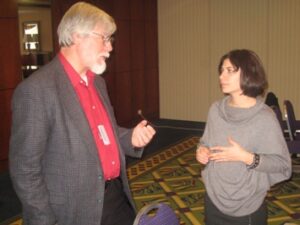
One of the Caucasus participants with faculty member Jerry Jacobs
The intention was for two participants from each of the three Caucasus countries (Georgia, Armenia, and Azerbaijan) to be invited. Eventually, based on level and quality of participation in the past workshops, and on language competence in English, one participant was invited from Georgia, two from Armenia, and three from Azerbaijan (see Appendix 3).
Recruitment of faculty
Faculty members were chosen, in conjunction with IUPsyS, as renowned international experts in their respective fields and relevance for the workshop topic, for their skills in presentation and interacting with participants from diverse backgrounds, and for their experience from past workshops (where they were originally chosen as renowned experts in their respective fields). Apart from one faculty member we had hoped would be able to join us again who was not able to participate due to a long standing commitment elsewhere, all potential faculty members approached agreed to participate. The final faculty list was as follows:
- Professor Thomas Elbert, University of Konstanz, Germany www.psychologie.uni-konstanz.de/en/research/clinicalpsychology/members/member-detail/elbertthomas-143/7347/7149/
- Professor Buxin Han, Academy of Sciences, Beijing, China http://sourcedb.cas.cn/sourcedb_psych_cas/en/epsychexpert/200907/t20090714_2073858.html
- Professor Jerry Jacobs, University of South Dakota, USA www.usd.edu/arts-and-sciences/psychology/clinical-psychology/gerard-jacobs.cfm
- Professor Tea Gogotishvili, Psychological Counselling and Training Center, Patriarchate of Georgia www.geopsys.ge/en/
- Professor Wolfgang H.R. Miltner, University of Jena, Germany www.biopsy.uni-jena.de/personen/leitung.html
- Professor Rainer K. Silbereisen, Center for Applied Developmental Science, University of Jena, Germany www.rainersilbereisen.de/
Financial resources
As noted in the introduction, funding for this workshop was largely met by the German Exchange Service (DAAD). As DAAD funds could only be used to support participants and faculty from the Central Asia and Caucasus region, and from Germany, additional funding was requested from and granted by IUPsyS as part of its capacity-building program. The University of Jena also supported the organisation of the workshop by providing staff and office facilities in Jena, and the University of Tbilisi and the Patriarchate of Georgia provided local support though the services of Professor Tea Gogotishvili and several student members of the department of psychology.
Plans for evaluating activities
An evaluation procedure was built into the workshop. Upon acceptance of their application, participants were sent a specially designed pre-workshop evaluation questionnaire that endeavoured to capture individual expectations concerning workshop proceedings, content, delivery, and outcomes. This was returned to the Jena office, or handed in at the workshop location prior to the commencement of the workshop. Immediately following the end of the workshop (see Workshop Program in Appendix 2), a post-workshop evaluation questionnaire, which included all items from the pre-workshop questionnaire, plus additional questions regarding participants’ satisfaction in different domains and whether their goals and expectations had been fulfilled, was given to all participants. A summary of the evaluation findings is given towards the end of this report; a full evaluation report can be found in Appendix 1.
Workshop Procedure
The workshop started with an opening and welcome address by the organizers, Rainer K. Silbereisen and Wolfgang Miltner, with additional words of welcome by local organizer, Tea Gogotishvili. As was necessary throughout the workshop, translation into Russian was required: this was undertaken on this occasion by Tea Gogotishvili. This was followed by dinner in the hotel that allowed everyone to get to know each other. This occasion was also used to distribute workshop materials, name badges etc., and to conduct some administrative business related to accommodation and travel.
The welcome address set the scene for the focus of the workshop and outlined its main aims as well as explaining the workshop model that would be followed. Faculty members who were present at this time (flight schedules meant that some had to arrive later that evening or early next morning) were introduced, as were the former Caucasus workshop participants (who had agreed to attend and act as ‘mentors’ for the new workshop participants) and the five members of Tbilisi State University Psychology department who had agreed to join the workshop and act as translators.
The workshop proper (full program details can be found in Appendix 2) started on November 18. Each of the three main workshop days followed the same organisational pattern. That is, each day commenced with an introduction to the day’s proceedings by one of the organizers, followed by a presentation by a faculty member and discussion, and then by small group tasks set by the faculty presenter.
A second faculty presentation followed the afternoon break. Each day was concluded by a full summary by a member of faculty of what had been presented and achieved during the day.
It is perhaps appropriate to mention the issue of language again here. As already noted, translators, supported by the Caucasus participants, were available to translate during all sessions. Translation was from Russian into English, and vice-versa. In addition to this, and in order to assist the ability of the CA participants to participate fully in the workshop, most faculty presentations were translated into Russian prior to the workshop. Hand-outs of the Russian translation were given to participants before a presentation was made and/or a translated electronic version of the presentation circulated among participants.
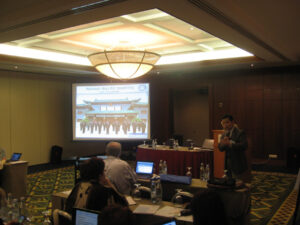
Presentation by faculty member Buxin Han
After a break for lunch, one group of participants (CA and Caucasus) presented their work via posters; this was followed by a question and answer session, and general discussion.
On the final day of the workshop there was an additional afternoon session related to future work and to maintaining contact with participants. In particular, the session focused on the importance and usefulness of networking and on the international organisations that can assist in this regard and in institutional and organizational capacity building. At this session, and in response to queries from participants, Rainer Silbereisen also gave a short presentation about future workshops and his hopes to run a further workshop focusing on the Asia Pacific region which would help in establishing a sustainable infrastructure for capacity building.
The final session of the workshop was the post-workshop evaluation exercise, which was completed by all participants. After the workshop, all presentations were made available electronically to participants.
Faculty Presentations
A brief overview of each faculty presentation is given below:
Thomas Elbert: Introduction to traumatic stress
The presentation set the scene for the workshop and gave an overview of traumatic stress, including basic concepts and theories. It included a presentation of the Lifeline concept, that is, the structuring of events in their temporal context.
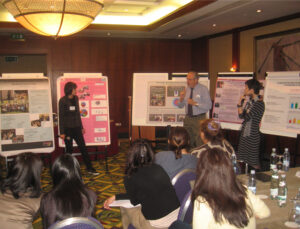
Poster presentation with faculty member, Rainer Silbereisen
Wolfgang Miltner: Depression and complicated grief in response to the unexpected loss of a significant other. Bereavement, depression, and complicated grief were discussed and considered in the context of being common human responses to stressful life events that involve the loss of a significant other. What is meant by bereavement, depression and complicated grief and the theoretical foundations of complicated grief (CG, Prolonged Grief Disorder PGD) was also explored. The neurobiology of bereavement, depression and complicated grief was outlined and interventions for complicated grief considered.
Buxin Han: Cultural issues in bereavement – the example of the Wenchuan earthquake
Differences in the concept and process of bereavement, grief, and mourning were presented, and three broad courses of bereavement, i.e., resilience, recovery, and chronic grief, were reviewed. Using the example of the Wenchuan Earthquake, cases of individual and group mourning, and related empirical studies, were introduced. It was shown that the timing and method of intervention (de-briefing vs. psychological first aid) following bereavement through disaster have to be considered carefully. Examples of the failure of psychological support were given from administrative and professional perspectives.
Rainer K. Silbereisen: IUPsyS: A global voice for national psychology organizations (The role of international scientific societies in supporting psychological research and intervention on disasters) This presentation gave an overview of the nature (global umbrella organization comprised of about 80 national psychology associations), mission (development, representation and advancement of psychology as a basic and applied science nationally, regionally, and internationally), and overall aims of IUPsyS (overcoming inequality of opportunities in training, research, and application of psychology). The role of IUPsyS was explained further by examples of how it had assessed the
situation concerning psychology worldwide; by detailing what analyses of causes for cross-national divides had been conducted; and by discussing the sort of remedies that had been undertaken. The final focus was on the role of national psychology organizations and international bodies involved in policy making.
Jerry Jacobs: A community-based model of Psychological First Aid (PFA)
This presentation focused on the community-based model of Psychological First Aid (PFA). This model of PFA is intended to be adapted to the needs of individual communities and focuses on preparing members of the general public (not mental health professionals) to provide basic grassroots psychological support for family, friends, and neighbors, and to more effectively manage their own stress. The presentation focused on the basic model of PFA and described the ways a variety of countries have adapted the model to be culturally responsive.
Thomas Elbert: An introduction to Narrative Exposure Therapy (NET)
First, the presentation gave a definition and description of trauma, illustrated by several case studies. It was then explained that following trauma, clinical intervention techniques are usually not sufficient for dealing with the situation. The normal human response is bury the memory of and the feelings associated with traumatic events – it may, in some circumstance, also be perceived as dangerous by an individual to bring traumatic events and associated feelings into the open – but it is only by so doing that true healing can occur. NET is based on the philosophy that speaking about and dealing with traumatic events in a safe environment serves both the health of the individual and society. The basic process of NET was demonstrated and discussed.
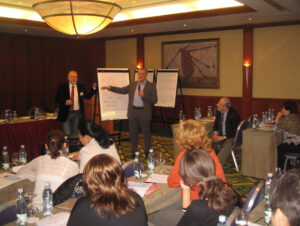
Presentation by Thomas Elbert: Discussant, Wolfgang Miltner, Germany
Group work
For the small group sessions, participants were placed into five groups based on a variety of grouping exercises to ensure random membership of CA participants and an even distribution of Caucasus participants and translators. In these small work groups, participants were asked to work on tasks set by the faculty member who had acted as presenter for that particular session. The tasks were introduced and explained by the presenter, and then either presented as a document written in Russian and English or presented as an overhead in English, which was then translated by the translators into Russian. The groups, each of which comprised three or four CA participants, a Caucasus participant, and a translator, was allocated an area or room in which to work and provided with materials to support their activities. Faculty members were available to support the groups and to answer questions, although overall supervision was by the session presenter. Group work was followed by a plenary session for groups to report back and present their findings and experiences. This was followed by a general discussion on the topic in hand.
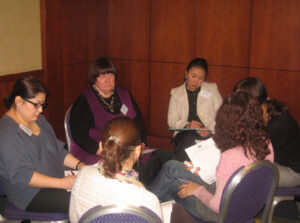
Small group work: Discussion
Poster presentations
Overall there were three poster panels, organised as much as possible by area of research or work focus. Each participant presented their work and received feedback from the faculty member leading that session, and from other faculty members present. Where necessary, a translator and/or one of the Caucasus participants supported the presenter and the overseeing faculty member, as well as enabling a question and comment session (whereby questions and comments were invited from other faculty members and from the other participants). The presentations of the participants’ posters and the in-depth discussion of their work were very well received by all involved, and the participants particularly seemed to value the advisory support that these sessions offered – so much so that the program was adjusted to allow for more time on days 2 and 3. As a matter of fact, for many participants this apparently was the first such experience in discussing research and application with an expert experienced in consultation and mentoring.
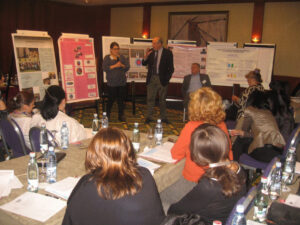
Poster presentation with faculty members, Rainer Silbereisen and Wolfgang Miltner
Evaluation
Before and after the workshop, a specially designed questionnaire that evaluated the different aspects of the workshop experience was given to the participants. These questionnaires, which had already been successfully used in the three previous IUPsyS capacity building workshops on bereavement, were this time also translated into Russian. Participants were sent a copy in English and in Russian and were free to choose which version they completed. Questionnaires completed in Russian were translated into English for evaluation purposes. For further information on the questionnaire, please go to Appendix 1, and for an overview about the items used in the evaluation, please refer to Table 1 in Appendix 1.
Judging by the mean levels of the pre-conference items, the greatest expectations of the participants referred to the match between lectures, discussion, and activities on the one side, and workshop objectives on the other as well as to clarity and comprehensibility of the presentations (e.g., “Instructors should present examples to clarify abstract concepts”). Taken together, all items were answered well above their scale mean and ranged between M = 3.34 and M = 4.78 indicating high expectations concerning specific workshop details.
In the answers to the open-ended question concerning the potential topics most participants mentioned strategies and methods in psychological assistance in emergency situation (e.g., death of close relative, natural disaster, war) as well as psychological diagnostic of traumatized children and adults. Moreover, many participants expressed the wish to get in touch with international experts in the field, to receive valuable feedback and tips on own clinical and research work, and to get in contact with fellow psychologists from the Central Asia region to build up a regional network.
Looking at the results of post-workshop evaluations, we can conclude that, as was the case in the three former workshops of this series, the current workshop was again very well received. As can be seen in Table 1, all pre/post items were again answered well above their respective scale mean. This applies especially to items referring to communication skills of the presenters (e.g., “Instructors communicated his/her subject matter well”) and to learning effects (e.g., “I will be able to apply what I learned”). Regarding the additional items that were only included in the post-workshop evaluation, the high level of satisfaction of the workshop is again obvious. For example, participants were very satisfied with the supervised group activities, and also rated their overall satisfaction with the workshop as very high (M = 4.48). Participants also reported a strong fulfillment of own expectations (M = 4.29), which, as noted above, where very high and ambitious before the workshop. From the open-ended items in the post-conference evaluation, it is evident that the small group work, the poster presentation sessions, and the positive and constructive atmosphere during the workshop were seen as highlights of the workshop.
When asked about possible improvements for future workshops, some participants would have liked shorter presentations by the experts to give more time for discussion. Others mentioned that they found the diversity and differences in language and scientific knowledge among the participants somewhat hindering because it complicated the group work. Other suggestions included more time for practical training and poster sessions. We suspect, however, that at the home institutions, teaching a diversity of approaches and demonstrating contrasting evidence, as done through the workshop, is not a common experience.
Concerning the application of the things learned during the workshop to their own work, most participants were confident that they could well apply the knowledge gained to practice (e.g., clinical work with traumatized people), to their own research, and to their teaching. Some mentioned that their new contact to the other participants will help them to apply their new knowledge.
To conclude, the evaluation indicates that the workshop was highly successful and effective in meeting the high expectations of the participants. The evaluation also confirms the positive impressions of the organizing team and the faculty members.
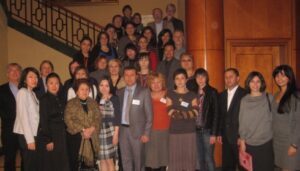
Participants and Faculty: Capacity Building Workshop for Countries of Central Asia: “Disaster and Bereavement”
Future plans
Capacity building is a high priority for IUPsyS, as demonstrated by its strong presence in the Union’s former and current quadrennial strategic plan. As already mentioned, hopes for future activities regarding capacity building in the Caucasus, Central Asia and the Asia Pacific regions have been discussed and an application has already been made by the Union for another workshop to be held in the Asia Pacific region; this time the focus will be on the role of resilience and new insights from biological science with regard to the psychological aftermath of disasters. To this end, the commitment of relevant people and institutions has already been attained.
Of core importance for future developments is the establishment of sustainable networks, although the role of individual countries and their own initiatives is crucial for any such networks to take root and become effective. To assist these aims, we will look to have a revolving system whereby participants of past workshops take part in new activities, as happened for the first time at the CA workshop.
